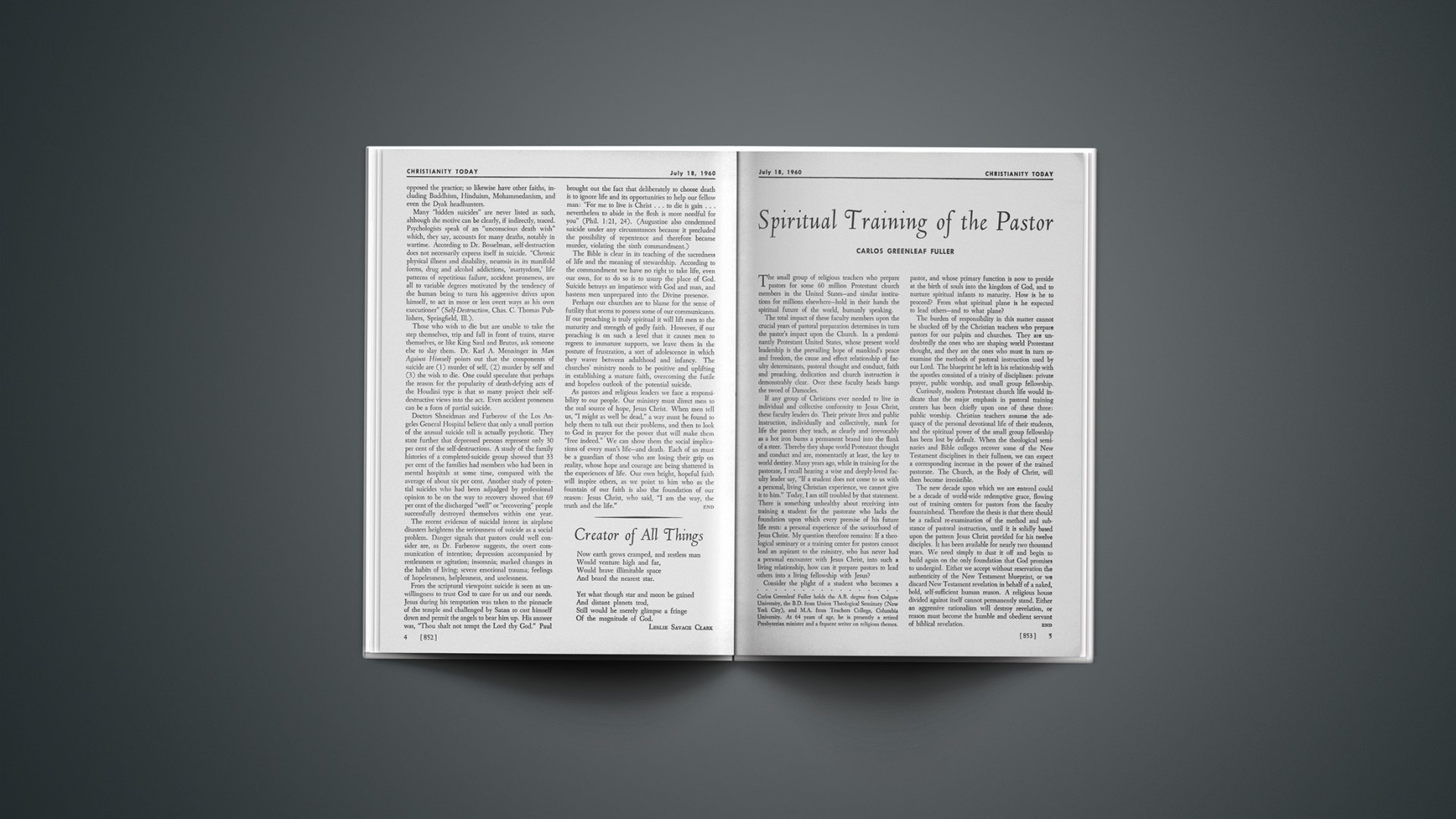The small group of religious teachers who prepare pastors for some 60 million Protestant church members in the United States—and similar institutions for millions elsewhere—hold in their hands the spiritual future of the world, humanly speaking.
The total impact of these faculty members upon the crucial years of pastoral preparation determines in turn the pastor’s impact upon the Church. In a predominantly Protestant United States, whose present world leadership is the prevailing hope of mankind’s peace and freedom, the cause and effect relationship of faculty determinants, pastoral thought and conduct, faith and preaching, dedication and church instruction is demonstrably clear. Over these faculty heads hangs the sword of Damocles.
If any group of Christians ever needed to live in individual and collective conformity to Jesus Christ, these faculty leaders do. Their private lives and public instruction, individually and collectively, mark for life the pastors they teach, as clearly and irrevocably as a hot iron bums a permanent brand into the flank of a steer. Thereby they shape world Protestant thought and conduct and are, momentarily at least, the key to world destiny. Many years ago, while in training for the pastorate, I recall hearing a wise and deeply-loved faculty leader say, “If a student does not come to us with a personal, living Christian experience, we cannot give it to him.” Today, I am still troubled by that statement. There is something unhealthy about receiving into training a student for the pastorate who lacks the foundation upon which every premise of his future life rests: a personal experience of the saviourhood of Jesus Christ. My question therefore remains: If a theological seminary or a training center for pastors cannot lead an aspirant to the ministry, who has never had a personal encounter with Jesus Christ, into such a living relationship, how can it prepare pastors to lead others into a living fellowship with Jesus?
Consider the plight of a student who becomes a pastor, and whose primary function is now to preside at the birth of souls into the kingdom of God, and to nurture spiritual infants to maturity. How is he to proceed? From what spiritual plane is he expected to lead others—and to what plane?
The burden of responsibility in this matter cannot be shucked off by the Christian teachers who prepare pastors for our pulpits and churches. They are undoubtedly the ones who are shaping world Protestant thought, and they are the ones who must in turn reexamine the methods of pastoral instruction used by our Lord. The blueprint he left in his relationship with the apostles consisted of a trinity of disciplines: private prayer, public worship, and small group fellowship.
Curiously, modern Protestant church life would indicate that the major emphasis in pastoral training centers has been chiefly upon one of these three: public worship. Christian teachers assume the adequacy of the personal devotional life of their students, and the spiritual power of the small group fellowship has been lost by default. When the theological seminaries and Bible colleges recover some of the New Testament disciplines in their fullness, we can expect a corresponding increase in the power of the trained pastorate. The Church, as the Body of Christ, will then become irresistible.
The new decade upon which we are entered could be a decade of world-wide redemptive grace, flowing out of training centers for pastors from the faculty fountainhead. Therefore the thesis is that there should be a radical re-examination of the method and substance of pastoral instruction, until it is solidly based upon the pattern Jesus Christ provided for his twelve disciples. It has been available for nearly two thousand years. We need simply to dust it off and begin to build again on the only foundation that God promises to undergird. Either we accept without reservation the authenticity of the New Testament blueprint, or we discard New Testament revelation in behalf of a naked, bold, self-sufficient human reason. A religious house divided against itself cannot permanently stand. Either an aggressive rationalism will destroy revelation, or reason must become the humble and obedient servant of biblical revelation.
Jacob J. Vellenga served on the National Board of Administration of the United Presbyterian Church from 1948–54. Since 1958 he has served the United Presbyterian Church in the U.S.A. as Associate Executive. He holds the A.B. degree from Monmouth College, the B.D. from Pittsburgh-Xenia Seminary, Th.D. from Southern Baptist Theological Seminary, and D.D. from Monmouth College, Illinois.










